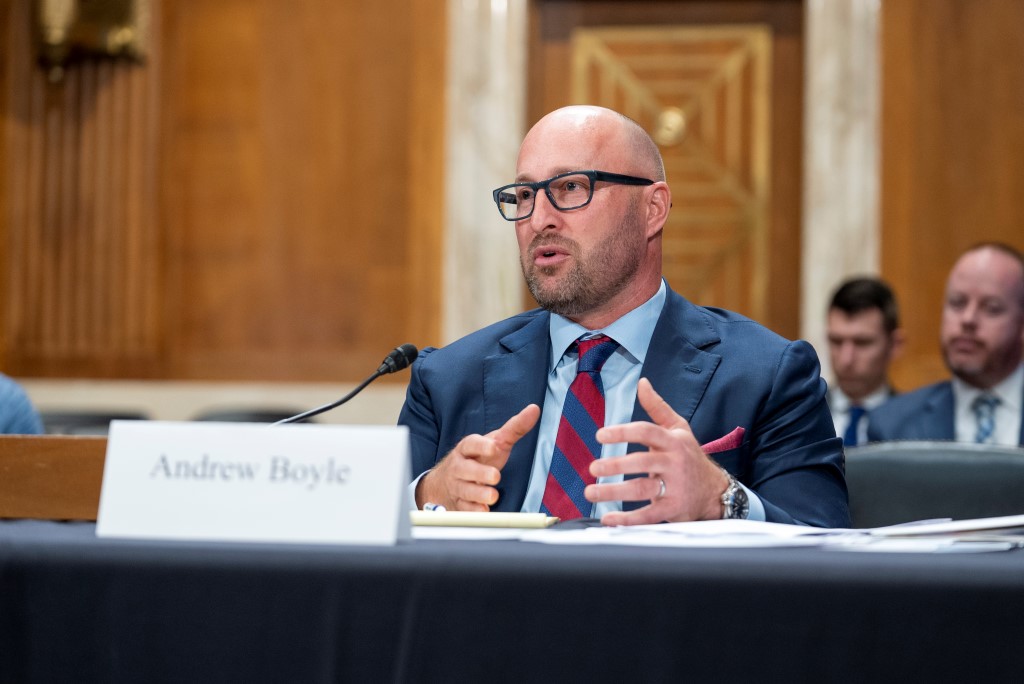
Andrew Boyle, ATA first vice chair and co-president of Massachusetts-based Boyle Transportation, went to Washington this week to testify before a Senate Environment and Public Works Subcommittee on the future of clean vehicles. As the manager of a truck fleet with one of the strongest environmental records in the industry today, Boyle injected a heavy dose of reality into the debate happening on Capitol Hill and nationwide over electric-vehicle mandates.
A cut from his opening remarks:
In the wake of the U.S. Environmental Protection Agency's decision to let California set de facto national emission standards for commercial vehicles, Boyle's testimony sheds light for lawmakers onto the gravity of these mandates—and how disconnected they are from current, real-world conditions.
Below are key exchanges from the hearing.
Regulators have put the cart in front of the horse.
A California company tried to electrify 12 forklifts. Not trucks, but forklifts. Local power utilities told them that's not possible.
If the product, charging infrastructure, and power is not available to comply with these unrealistic timelines, then regulators are setting trucking—and the American consumer—up for failure.
Failure is not merely inconvenient; it’s catastrophic."
Sourcing, reliability, cost, and other operational concerns are being ignored.
Trucking is not averse to challenges, but we cannot overcome the challenges that lawmakers choose to ignore.
Today, a clean diesel truck can spend 15 minutes fueling anywhere in the country and then travel about 1,200 miles before fueling again. In contrast, today’s long-haul battery electric trucks have a range of about 150-330 miles and can take up to 10 hours to charge.
A new, clean-diesel long-haul tractor typically costs in the range of $180,000 to $200,000. A comparable battery-electric tractor costs upwards of $480,000. That $300,000 upcharge is cost-prohibitive for the overwhelming majority of motor carriers. More than 95% of trucking companies are small businesses operating ten trucks or fewer.
Complying with these mandates will push many carriers out of business and tighten capacity nationwide, causing severe price inflation for all goods.
Weight factors are another inconvenient truth. Battery-electric trucks, which run on two approx. 8,000-lb. lithium iron batteries, are far heavier than their clean-diesel counterparts. Since trucks are subject to strict federal weight limits, mandating battery-electric will decrease the payload of each truck, putting more trucks on the road and increasing both traffic congestion and tailpipe emissions.
Sourcing rare minerals needed to produce lithium iron batteries is another major hurdle. Tens of millions of tons of cobalt, graphite, lithium and nickel will be needed, which could take as long as 35 years to acquire given current levels of global production. Expanding that capacity carries a giant environmental footprint and would rely heavily on foreign child labor from nations like the Democratic Republic of Congo unless the U.S. is willing to permit more domestic mining operations.
We just manifest our own density that way."
California standards will unleash supply chain disruptions nationally.
The trucking industry is fully committed to the road to zero emissions, but our path to get there must be logical. Success depends on regulations that are technically achievable, national in scope, and set on a realistic timeline. A patchwork of state regulations impedes interstate commerce and our ability to move critical goods across the country, and unachievable targets only set us further back from our shared goal.
Repealing the federal excise tax would create immediate environmental gains.
Thanks to collaboration between industry and government, today’s clean diesel trucks produce 99% lower emissions than those from the 1980s. 60 trucks today emit what just a single truck emitted in 1988. However, a century-old 12% federal excise tax on heavy-duty vehicles disincentivizes fleets from updating their equipment with today's clean diesel tractors.
Sequence matters.
Without the required infrastructure, motor carriers cannot properly plan and invest in battery-electric trucks.
Bottom line: The trucking industry starts with 'yes.' We are committed to protecting the environment and shrinking our footprint, and we have proven that. All we ask for is honesty and transparency about the road ahead. While we share the passion for EVs in cars and light-duty vehicles, projecting an automotive construct onto trucking industry dynamics is a massive mistake.
Success will depend on national standards with achievable targets and realistic timelines that enable innovation to flourish.